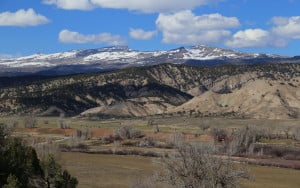Despite current sluggish oil prices, the issue of understanding mineral rights on Colorado ranches for sale continues to be a hot topic. A decade ago, few mountain-area landowners considered oil and gas development to be a threat to their properties’ pristine landscapes— the idea of drilling from a relatively high altitude to reach oil or gas seemed highly improbable. The unlikeliness of oil and gas development, combined with the frantic pace of the ranch real estate market, caused many buyers to quickly purchase ranches without a full accounting of the mineral rights ownership.
With the emergence of deep directional drilling and hydraulic fracturing, many areas once considered impossible for drilling have become hotbeds of oil and gas development. Now, many ranch buyers are much more sensitive to the importance of understanding a ranch’s mineral rights ownership prior to a purchase, even in areas where the general consensus is that there is no prospect for drilling. If we have seen anything in the last decade, it is that technology is advancing at a pace that quickly makes many things once thought impossible, possible.

As most Colorado ranch buyers know, mineral rights can be severed from the land, potentially creating a situation where a landowner owns his or her ranch, but not the minerals beneath it. In this situation, the worst case scenario is that an oil, gas, or mining company could own the minerals, enter the ranch, and set up drilling rigs, dig holes, construct platforms, build roads, and bring in crews of workers, all without paying the landowner a dime. No matter your stance on mining or oil and gas production, it is safe to assume that no sensible landowner would be happy about this situation!
So, how do you go about fully understanding who owns the mineral rights? Unfortunately, it is not always as simple as a quick online ownership search of the county records. Mineral rights can be extremely fragmented, past sales may not have been recorded on county records, and there can be dozens or even hundreds of owners for the mineral rights associated with one moderately sized ranch.
The first place to start is the title commitment. If the title commitment clearly states that the current landowner also owns all of the mineral rights and the title company stands behind (i.e. insures) this statement, then the buyer can put to rest any concerns about mineral rights. However, rarely does it work out this easily. The majority of the time, there are few, if any, references to the minerals, and the title company includes an exception stating that all mineral interests are excluded and will not be insured.
When the title commitment fails to give a clear picture, buyers have several alternative options for determining mineral ownership. Some choose to obtain a mineral title opinion from an attorney specializing in mineral rights. There are also non-attorney individuals and companies that can research the mineral rights and issue a report detailing the ownership of all associate rights. Depending on the buyer’s budget, time constraints, location of the ranch, and complexity of the ownership, either of these options could be a viable and effective method of understanding the mineral rights.
For those who enjoy dingy courthouse basements and endless hours combing through government website databases, there are plenty of options for attempting to research them on your own (although I would not recommend it). County assessors’ offices are a good place to search, as most Colorado counties tax both the land and minerals. The Colorado Oil & Gas Conservation Commission and the Colorado Division of Reclamation Mining & Safety also offer online services to research mineral leases— a mineral lease on a ranch for sale is a good indicator that the rights have been severed. Finally, the Bureau of Land Management has extensive online resources to understand federal leasing programs and federally reserved minerals.
Unless a buyer has extensive experience in this type of research, we recommend hiring a skilled attorney or researcher. Depending on the ranch and its location, the cost of incorrectly researching the minerals could be significant, so any fee paid to fully understand the minerals is money well spent. At Mirr Ranch Group, we are always happy to walk our clients through the process and, if necessary, make a referral to one of the skilled attorneys and researchers in our network.
For more information on mineral rights in Colorado, I highly recommend the Colorado Coalition of Land Trust’s Mineral Development and Land Conservation Handbook. Although the book is written for conservation professionals, it provides a wealth of information that would be useful to any Colorado ranch owner or potential buyer.
